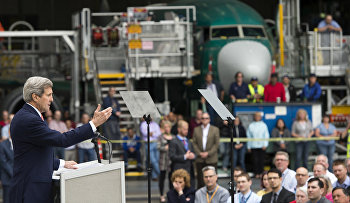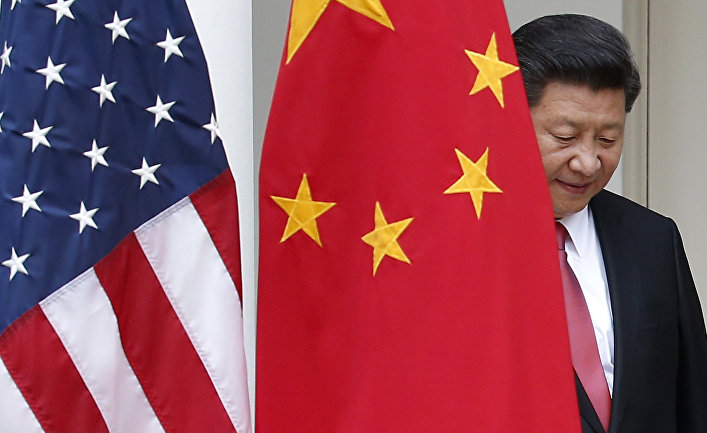“If we don't set the rules for world trade, then China will do it for us” said Barack Obama. There is clearly no need to detail the depth of rivalry going on between the US and China. If Russia and China are attempting to expand on their existing processes of integration — while respecting each other's interests in their development – then the United States ploughs on with its latest project, the Trans-Pacific Partnership (TPP). As is immediately apparent, it's a project purposely created to supplant both ASEAN and APEC.
So what does the TPP really mean — and how will it impact China and Russia? The Trans-Pacific Partnership is a trade agreement – based on the abolition of customs duties on goods and services within the Asia-Pacific region. The idea was first mooted by Brunei, Singapore, New Zealand, and Chile. These first-adopters were soon joined by the USA, Australia, Canada, Peru, Vietnam, Malaysia, Japan, and Mexico.

Practically each participant in the group believes itself to be the leader of the project. Thus Japanese PM Shinzo Abe says “historians in future will aver — with no shadow of a doubt — that the TPP has inaugurated the Century Of The Asia-Pacific Region. Japan shall be at the centre of that century.” Meanwhile, for Singapore and New Zealand the TPP is believed 'to be their very own methodology for the development of processes of integration in the region.” However, US representatives have also set forth their views on the subject – that it should be precisely they, who “lay down the rules” for world trade. And whether this turns out to be through the TPP or some other structure is utterly irrelevant for them.
Today China is the US's largest and most direct competitor in the Asia-Pacific Region. Only China has the ability to “plant” aspects of the economies of neighboring countries of the region within its own boundaries. For China, this is one of its crucial strategies in its own economic development. Of course it goes without saying that this kind of economic integration — with its centre in China — is the gravest threat to American policy in the Asia-Pacific Region.
#TPP cannot 'isolate China', could lead China to reach similar deals with other nations http://t.co/2Rx6pCbS9M pic.twitter.com/QlpiECWT9q
— People's Daily,China (@PDChina) October 8, 2015
For Russia, however, the emergence of a “bloc” in the Asia-Pacific Region presents no threat in the slightest. For Russians, the region remains the same, with China as its leading partner. Even so, China cannot remain unchanged. After all, the US has made off with China's partners. Furthermore, the greater portion of Chinese capital will inevitably migrate to the US – leaving the Americans, once more, with a very sizable slice of the pie. Factor in China's current flailing to avoid being sucked-under in the economic crisis, and the degree of potential damage — as well as the feelings of ordinary Chinese people about the situation — becomes extremely clear.
New chapter of secret #TPP deal, limiting access to medicine and IP, unveiled by @Wikileaks. https://t.co/C38E8HRBul pic.twitter.com/mhtbcesUEO
— Edward Snowden (@Snowden) October 9, 2015
Chinese comeback
The Head of the International Cooperation Section of the Chinese Institute of Economics, at the National Committee for Reform and Development of China, Zhang Jianping, gave his views on the situation. “The TTP will undoubtedly impinge on our economy. Today, China has signed bilateral trade agreements with two-thirds of those countries who are putative TPP members. So, to some level, we are already able to fend off the impact the Partnership will have on us. We've already opened discussion about a Comprehensive Regional Economic Partnership (CREP) that currently has the green light from sixteen countries – including India, Japan, Australia, New Zealand, and others. If we're able to wield this gigantic economic platform, we'll ameliorate the likely damage the TTP could cause to our national economic interests.”
#China vs #TPP: Will Beijing join forces against Trans-Pacific Partnership? http://t.co/5HixswcMqk pic.twitter.com/vhIaGKbWgg
— RT (@RT_com) October 8, 2015
In closing, it's worth noting that Russia is a genuine competitor to the US in Europe — while barely competing with the USA in the Asia-Pacific Region. If the US is “prodding” China with its TPP plans, for Russia this means that the USA will soon be doing the same to Russia — through its planned Euro-Atlantic Partnership. But when it comes to that particular project — in contrast to the TPP — there are more questions than answers.






